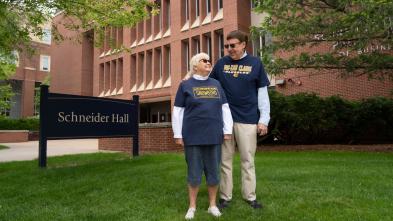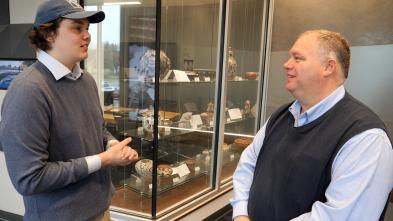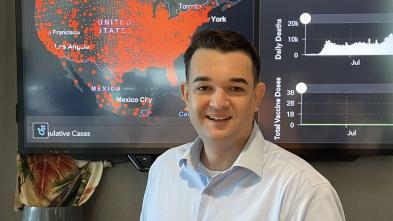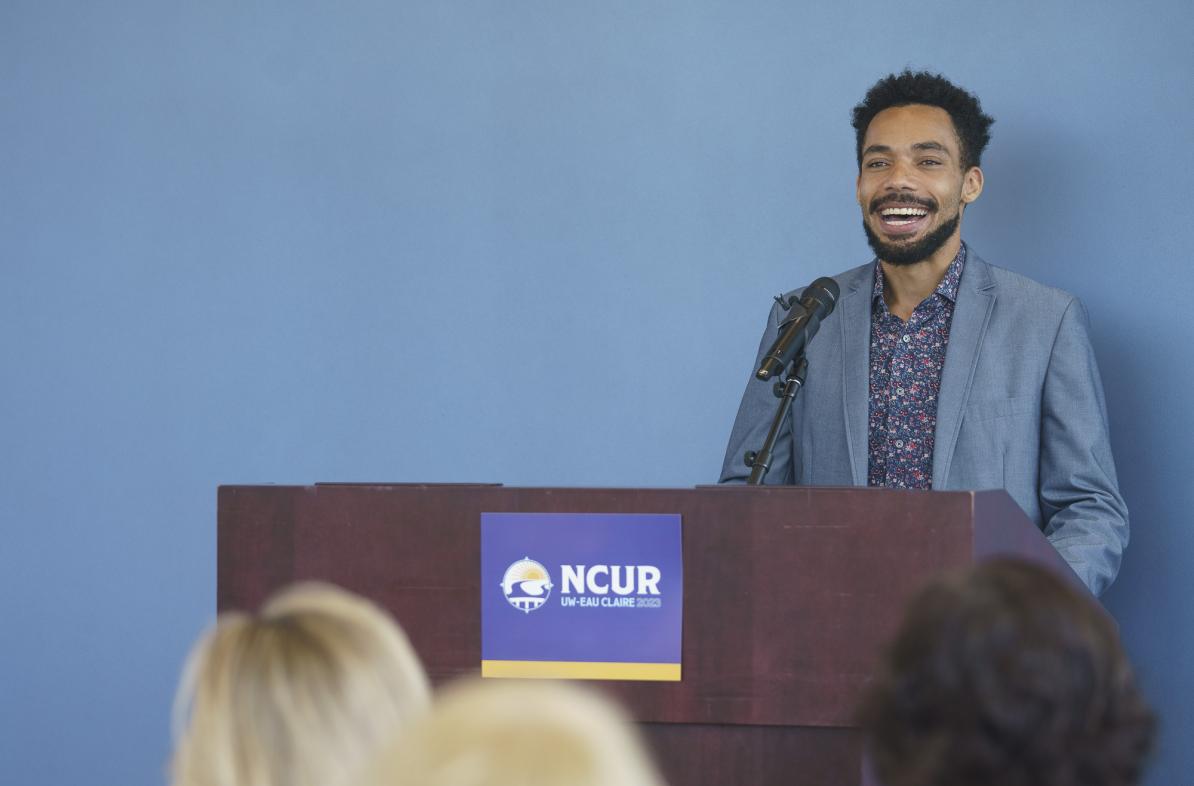
UW-Eau Claire grad says undergraduate research and faculty mentors made Rhodes Scholarship possible
Tayo Sanders II was a University of Wisconsin-Eau Claire junior when he got a message from his research mentor encouraging him to apply for a Rhodes Scholarship, something he’d never heard of before.
When he researched it, Sanders was certain he’d misunderstood her message because the Rhodes program — which includes a full scholarship to study at the prestigious Oxford University in England — typically selects students from internationally known universities like Harvard and Yale, not regional public universities in Wisconsin.
“I actually assumed I was spelling it wrong, so I tried it different ways before calling her back to say I think she made a mistake,” Sanders said.
Fortunately, Sanders listened when Dr. Jennifer Dahl assured him there was no mistake — the UW-Eau Claire chemistry and biochemistry professor believed he belonged in the elite scholarship program, whose members include former U.S. presidents, CEOs of international corporations and famous artists.
A year later, Sanders, who graduated from UW-Eau Claire with a degree in materials science with emphases in chemistry and liberal studies, was one of 32 Americans named 2015 Rhodes Scholars. In 2019, he earned his doctorate in biomedical engineering from Oxford.
Now carrying the title of Dr. Tayo Sanders, the Blugold returned to UW-Eau Claire in April to share his story of growing from a nervous first-generation college student into a Rhodes Scholar. He was among the speakers at the National Conference on Undergraduate Research, an event hosted by the university that brought 3,600 undergraduate students and their faculty mentors to campus.
“I didn’t quite appreciate how much happiness would come back to me when I walked on campus,” Sanders said of his alma mater. “Some of my warmest and most incredible memories were made here. Some of my most significant relationships happened at this institution, and some of the most formative experiences of my life happened here.”
Undergraduate research and his faculty mentors were at the center of all of it, Sanders said.
While congratulating current students on presenting their research at a national conference, Sanders told them this is the beginning — not the end — of how their undergraduate research experiences will shape their future lives and careers.
The knowledge they gain through their research is important, but what matters even more is building lasting relationships with faculty mentors, discovering they can do hard things, becoming comfortable with failing and realizing that embracing one opportunity often leads to many more, Sanders said.
All those things and more were possible for him because of the opportunities and mentors he found at UW-Eau Claire, said Sanders, who now serves as the director of the Southern Research Venture Studio, an organization focused on commercializing early-stage life sciences technology in Birmingham, Alabama. He previously worked with investors and startups in biotech and industrial technology.
“Beyond applying classroom concepts to the real world, the research process sharpens our curiosity, hones our ability to pivot and reminds us that failure is more common than success,” Sanders said.
Embracing opportunities, building relationships
A curious kid, Sanders always was asking questions, eager to figure out how the world around him worked. His parents encouraged his curiosity and his academic aspirations, but since neither had attended college, they were limited in how they could help him navigate college and his future career.
“I was blessed to have parents who supported my education in the most positive ways,” Sanders said. “I knew whatever I wanted to do they would be behind me. But they didn’t really know the options. I came to UW-Eau Claire more than a little clueless of college life.”
Since he excelled at math and science, Sanders started college on the pre-med track, assuming medical school was the only path that aligned with his academic interests. At the time, he didn’t know being a scientist was a real career option. He never imagined his current job — serving as a liaison between science and industry — even existed.
Sanders started thinking a little differently after he and his father were on campus for freshman orientation and, by chance, met Dr. Matt Evans, director of the Blugold Fellowship, a scholarship program that connects new freshmen and faculty research mentors.
“He had one slot left, and he invited me to fill it,” Sanders said of Evans. “I had no idea what research even meant, but still I said yes. I love science, and this was a way to get back to what I love most.”
Two weeks into his freshman year, Sanders said Evans “kicked me out of the nest and told me to go talk to a professor; to find a research mentor.” He liked chemistry, so he asked his professor if he had openings in his lab. He didn’t, but his wife, Dr. Jennifer Dahl, was nearby and invited him to visit her lab.
“When I got there, a student was looking at silver nanoparticles under a microscope,” Sanders said. “It was cool, so I said ‘I’m in.’”
Despite being a freshman with no research experience, Sanders quickly became the “right arm” of Dahl in her nanoparticle research.
“It was an absolute blessing having such an ambitious and talented student join my group so early in my career,” Dahl said. “We did all the things we hoped to accomplish. We achieved our goals in the lab, shared our science at conferences and published our work together. Those are all hallmarks of success for a research experience.”
However, research success was just the beginning for Sanders. When people outside of UW-Eau Claire began noticing his talent, he had even more opportunities to grow as a researcher and scientist, Dahl said.
Sanders was awarded the prestigious Goldwater Scholarship, an honor that goes to the top science students in the country. His research was published in professional journals, and he presented his research findings at the local, state and national levels. With funding from the National Science Foundation's Research Experiences for Undergraduates program, he spent a summer studying nanoparticles with a research team in France.
Then came the Rhodes Scholarship, often described as the best-known award for international study, and the most famous academic award available to American college graduates. Winners are selected on the basis of high academic achievement, personal integrity, leadership potential and other attributes.
Sanders said none of it would have been possible without Dahl taking a chance on him.
“As a new freshman, I was given an incredible opportunity to start doing undergraduate research,” Sanders says. “I was literally terrified. I was excited but also terrified. But I’m glad I took that opportunity because from it, I was encouraged to take so many more opportunities that I wasn’t even aware existed, including the Rhodes Scholarship.”
Dahl’s confidence in him never wavered, even when “I had no idea what I was doing,” Sanders said. She was just happy to have a student who was eager to be part of the project, he said. “The only thing I ever heard from her was excitement and encouragement to keep going,” he said.
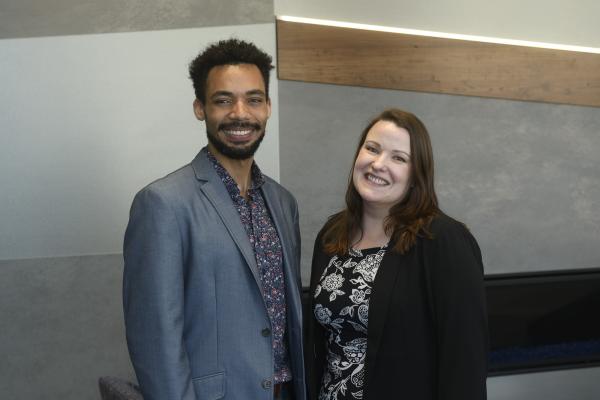
With Dahl and other UW-Eau Claire faculty encouraging him, Sanders said he “started believing in myself a bit more. I started taking chances, believing what they were saying. If they thought I could so something, even if I wasn’t sure I could, I’d try anyway.”
Coming into college, Sanders says he was “terrified of failure, of letting people down who took a chance on me.” His UW-Eau Claire mentors taught him to “appreciate that failure is a process,” Sanders said.
“UW-Eau Claire gave me the space to practice failing,” Sanders said. “I worked hard and did well academically, but my research was a lot of me learning to be OK not being the best, not doing things correctly, making mistakes, and learning how to draw insight and grow from it. That’s a skill that’s absolutely invaluable. Dr. Dahl taught me that failure is the process, not the metric.”
Being a Rhodes Scholar
Sanders also was nervous going to Oxford, knowing that many of the other scholars came from backgrounds far different from his own. He quickly learned he had no reason to worry.
“People were intellectually curious, but mostly I was really impressed by the depths of relationships I made there,” Sanders said. “I met some of my closest friends and mentors at Oxford. I didn’t expect to develop such a rich community there.”
At Oxford, Sanders continued the research he started at UW-Eau Claire, building on the knowledge and skills he’d learned as an undergraduate. He also began to think about his future.
“I spent four years having an incredible time working on the research and experiencing the Rhodes program and community,” Sanders said. “I was challenged in ways I couldn’t have imagined. I also spent time developing my own perspectives and ideas about what I wanted to do next.”
Sanders began thinking about how he could serve as a “champion for ideas that have potential to make a difference in the world.” He became “fascinated” by the idea of being a bridge between science and business, “taking what we do in the lab and moving it into the real world.”
His current position allows him to do just that by bringing science and industry together, Sanders said.
“It’s really about using my skills as a scientist and researcher to be a translator for the rest of the world,” Sanders said. “Being a translator, being able to communicate why research matters, why science matters, being able to support and mentor other folks trying to do similar things. I’m finding a lot of enjoyment in that right now.”
Sanders is UW-Eau Claire’s second Rhodes Scholar. In 2005, Chauncy S. Harris Jr. also earned the honor. He graduated from UW-Eau Claire with degrees in geography and history.
You may also like
